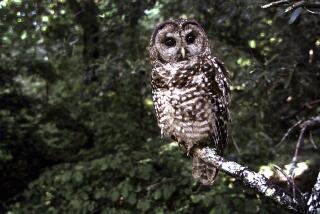Environment: Not Giving a Hoot : Bush Administration undercuts top scientific panel on spotted owl issue
- Share via
The Bush Administration could not have found a more bizarre way to prepare for the President’s trip to the Earth Summit in Rio de Janeiro next month.
One of the most important questions on the agenda of the U.N. Conference on Environment and Development is how to stem the destruction of plant and animal species that is being committed in the name of economic growth.
So how did the Administration spend Thursday? Trying to torpedo a decision by a panel of top government scientists to begin restoring the population of spotted owls that live in the ancient forests of the Pacific Northwest.
Bush was already under fire for making it clear--as a condition for even attending the Rio meeting--that the United States will make up its own mind about how fast and how far to go in trying to ease the danger of global warming. His Administration’s reaction to the owl decision can only make some countries that seek to go further in acting against the so-called greenhouse effect wonder why they bothered to make any concessions.
The survival of plant and animal species--the preservation of what scientists call biodiversity--goes beyond wanting to protect cuddly owls with round faces and big, dark eyes. Scientists calculate that half of the Earth’s remaining species live in tropical forests, most of which are in quite poor nations. They also know that the forests have in the past served as breeding grounds for plants whose chemical compounds provided clues to wonder drugs. What they do not know is how many more wonder drugs may one day be found in the forest and which diseases they might cure.
The Earth Summit hopes, among other things, to produce agreements under which poor nations will stop destroying tropical forests--and those species that live in them. In general the poor nations ask how their people are to survive if they cannot sell the forests’ valuable hardwoods.
The Bush Administration’s very public pre-Rio lack of concern for an endangered species is hardly an answer that poor nations will respect.
More to Read
Sign up for Essential California
The most important California stories and recommendations in your inbox every morning.
You may occasionally receive promotional content from the Los Angeles Times.











